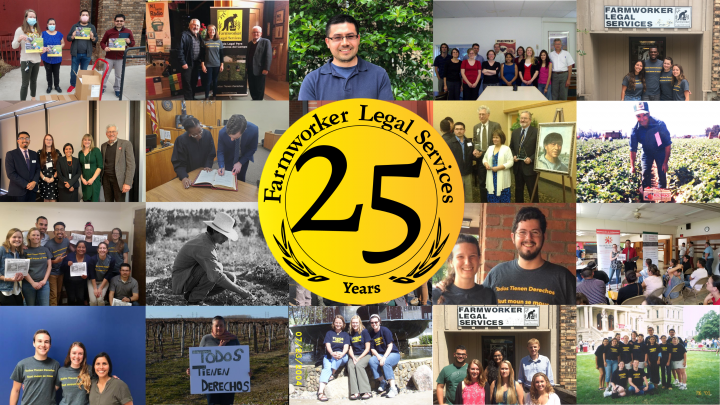This year Farmworker Legal Services (FLS) proudly celebrates 25 years of fighting for justice and dignity alongside farmworkers in Michigan. In 1997, FLS was established as a statewide legal resource center committed to ensuring migrant, immigrant, seasonal, temporary, and year-round farmworkers equitable access to economic and social justice and providing civil impact litigation and advocacy. Since then, FLS has provided direct legal representation to more than 15,000 individuals in matters involving unpaid wages, unsafe housing or working conditions, labor trafficking or exploitative employment schemes, unlawful recruitment fees, retaliation, evictions, public benefits, civil rights abuses, unemployment, immigration, and countless other litigation and advocacy successes.
Michigan is estimated to have over 70,000 farmworkers active in the state each year. Those farmworkers, and their family members, have specialized legal needs and face unique barriers that restrict their access to legal assistance. Farmworkers are exempt from many laws designed to protect workers. Farmworkers are often required to live in isolated employer-provided housing and regularly work over 40 hours per week without overtime pay (and often without making the minimum wage). Migrant and seasonal farmworkers must often rely on their employers or supervisors for housing, transportation, and sometimes even access to food and medical care. Due to the transitory and seasonal nature of their work, cultural isolation and language barriers, and discriminatory labor and employment laws, agricultural employers often exploit farmworkers.
FLS addresses the barriers farmworkers face by providing culturally sensitive and linguistically appropriate legal expertise and programming. For example, since 1997, FLS has staffed the Farmworker Hotline and has been considered the “law office of first resort” for farmworkers in Michigan. Since 1998, FLS has published and distributed annual calendars to farmworkers. These calendars track the migrant season and contain information on a broad range of topics that affect the rights of farmworkers and their families. The calendars serve as a tool for workers to record an accurate calculation of their hours and wages owed. On average, FLS visits around 300 farmworker labor housing camps each year to observe the living conditions of farmworkers and their families and to ensure access to legal services and know-your-rights materials like the calendars. During those camp visits, FLS' bilingual staff meet with around 2,000 farmworkers to discuss legal concerns they may have and ensure they understand their rights and how to access services. FLS partners with 46 community agencies and NGOs to distribute more than 18,000 calendars to farmworkers throughout Michigan.
In 2009, FLS and the Michigan Poverty Law Program launched the Michigan Immigrant Rights Project (MIRP), an offshoot of FLS’s Battered Immigrant Project. MIRP has since become the Michigan Immigrant Rights Center (MIRC) and operates as a separate and successful program of the Michigan Statewide Advocacy Services (MSAS).
FLS and MIRC continue to collaborate on delivering services to immigrants in Michigan. Since 2017, FLS and MIRC have jointly staffed the Immigrant Worker and Farmworker Hotline to provide technical assistance, a seamless intake process, and coordination of services for low-wage immigrant and agricultural workers. Since 2016, FLS has focused its representation of farmworkers on their civil claims and immigration cases involving relief based on labor-related crimes.
For example, in one case, over 50 farmworkers were recruited from Mexico to work in the United States under fraudulent pretenses. Based on the promise of good wages and work in Michigan, the workers applied for, paid for, and received H-2A work visas that allowed them to travel to the United States to perform agricultural labor for a Michigan employer. However, after they began performing labor picking blueberries, their employer refused to pay them the wages they were owed and required them to work long hours without breaks under a grueling and unreasonable production standard. Their employer refused to provide them with access to laundry services, which is critical in reducing the harm caused by pesticide exposure and is required by federal laws. Ultimately, their employer unlawfully terminated them before the end of their contract without full payment.
FLS assisted the workers in filing a complaint with the U.S. Department of Labor (DOL) to cease the employer's unlawful employment and recruitment practices. As a result, the DOL determined that the company owed employees damages exceeding $110,000 and owed the DOL around $3,000 in civil monetary penalties. FLS assisted the clients in obtaining their back wages through the DOL’s settlement. FLS further assisted 28 workers and their derivatives in applications for immigration relief based on their being the victim of an employment-based crime.
Further, as a result of FLS’s representation and administrative advocacy, in this case, the DOL initiated a pilot program in the Midwest Region to improve the identification of workers owed wages under Wage and Hour Division settlements, communication with workers, and distribution of payments to workers.
FLS clients often need support in both enforcing their civil claims and accessing the related immigration relief available to them, like the workers in this case. To expand FLS’ ability to provide representation to farmworkers in these immigration matters, FLS sought and received approval from the Board of Immigration Appeals (BIA) to allow Accredited Representatives (i.e. non-attorney staff) to represent immigrants in their applications for U.S. Citizenship and Immigration Services.
When the onset of the COVID-19 pandemic in 2020 devastated thousands of farmworkers, FLS leaped into action immediately. FLS created and updated resources and virtual training materials and worked with partner organizations, including mobile vaccination and testing units. In 2021, FLS collaborated with Michigan Legal Help to create online resource materials and worked with the Michigan Department of Civil Rights to broadcast 140 public service announcements related to fair housing for farmworkers. FLS is also contributing to significant research on the pandemic's effect on farmworkers in partnership with the Michigan Department of Civil Rights, the Michigan Department of Health and Human Services, and researchers at the University of Michigan. Looking forward, FLS is excited to continue adapting its services to improve access to justice for farmworkers and their families.

